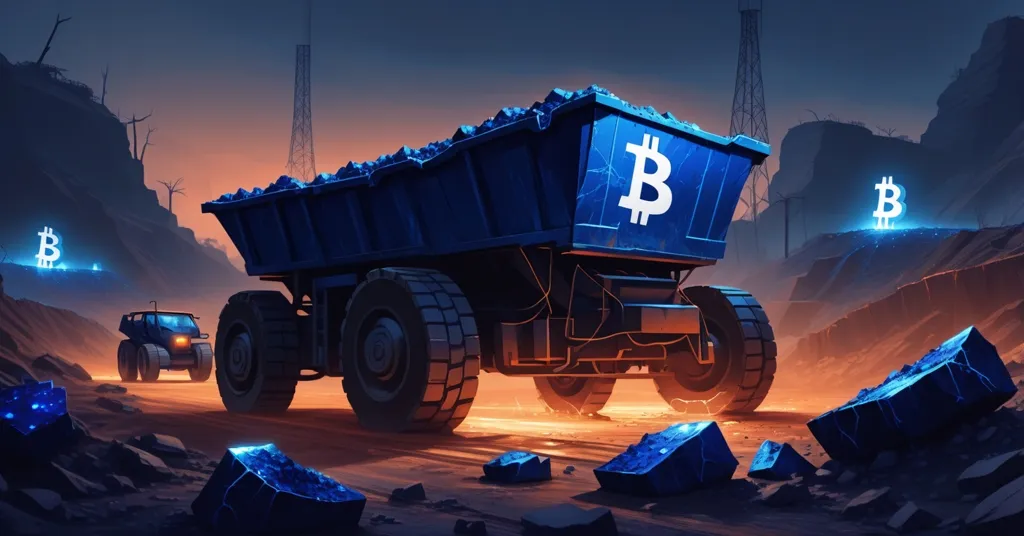DRC Extends Cobalt Export Ban: Supply Crisis Hits EV, Tech, and Bitcoin Mining

Congo’s Cobalt Export Ban Extension: A Supply Chain Crisis for EV, Tech, and Bitcoin Mining
The Democratic Republic of Congo (DRC), the undisputed kingpin of global cobalt production, has dropped a bombshell by extending its export ban on this critical mineral for another three months, pushing the deadline to September 2025. Supplying roughly 70% of the world’s cobalt—a cornerstone for lithium-ion batteries in electric vehicles (EVs), smartphones, and even the power-hungry hardware of Bitcoin miners—this decision sends shockwaves through industries already on shaky ground. It’s a bold move that could throttle supply chains, spike prices, and force innovation, but at what cost?
- Ban Extension: DRC cobalt export suspension now runs from June 23 to September 2025.
- Global Hit: 70% of cobalt supply locked down, disrupting EV, tech, and crypto hardware chains.
- Industry Rift: Glencore pushes quotas, CMOC Group demands ban lift, revealing deep divides.
The Roots of a Resource Standoff
Let’s cut to the chase. The DRC kicked off this saga with a four-month cobalt export ban in February 2025, targeting a crippling oversupply that dragged global prices to a nine-year low of $10 per pound. The goal was to stabilize a market drowning in excess stock, as declared by Congo’s mineral regulatory body, ARECOMS (Authority for the Regulation and Control of Strategic Mineral Substances’ Markets). Now, with this three-month extension of the cobalt export ban announced on June 23, 2025, they’re holding firm, insisting the oversupply problem persists.
“The decision has been taken to extend the temporary suspension due to the continued high level of stock on the market.”
That’s straight from ARECOMS’ official statement. They’ve pledged to monitor stock levels and market conditions, promising further guidance before September 2025. But face it—three months feels like an eternity in industries racing against time, whether it’s EV makers chasing climate targets or Bitcoin miners optimizing for the next halving. This isn’t just a pause; it’s a chokehold on critical supply chains for EV batteries.
For the uninitiated, cobalt is the magic ingredient in lithium-ion batteries, the tech that powers everything from your latest gadget to Tesla’s slickest ride. It’s especially vital for EVs, which rely on cobalt for battery stability and energy density, and indirectly for crypto miners who need high-performance batteries for portable or backup power in rigs, particularly in regions with unreliable grids. With the DRC controlling the vast majority of global cobalt output, this ban yanks 70% of the supply off the table. That’s not a minor snag; it’s a full-scale crisis for manufacturers and tech innovators already battered by logistical headaches.
Industry Titans Clash Over Strategy
The fallout from this ban has split the biggest players in cobalt mining down the middle. Glencore, the Anglo-Swiss mining juggernaut and a heavyweight in DRC cobalt production, is taking a calculated stance. They’re advocating for a quota system once exports resume, arguing it’s the best way to manage supply and avoid another price nosedive. At a recent Singapore conference, Glencore traders doubled down, stressing the need for stable pricing before any ban lift. It’s a pragmatic play—control the flow, control the market.
On the other side, CMOC Group, a Chinese state-backed mining giant with massive stakes in DRC mines like Tenke Fungurume, is livid. They’re projecting a staggering 100,000 to 120,000 metric tons of cobalt output in 2025—nearly double their 2023 numbers—and view the ban as a market-wrecking disaster. CMOC is pushing hard for an immediate end to restrictions, warning that prolonged bans could fracture long-term supply relationships. Their conflict with Glencore over the DRC ban has also raised eyebrows among Congolese officials, who suspect strategic stockpiling or price manipulation tactics. It’s a messy standoff, and the stakes couldn’t be higher.
Geopolitical Power Plays and Resource Nationalism
Zooming out, this isn’t just about cobalt—it’s a high-stakes geopolitical chess game. The DRC’s decision reeks of resource nationalism, a tactic where countries tighten their grip on critical minerals to wield economic or political leverage. Think of it as a landlord jacking up rent to dictate who gets a seat at the table. With Western interests (Glencore) and Chinese influence (CMOC) colliding over Congo’s resources, we’re witnessing a snapshot of broader U.S.-China tech rivalries. Historically, the DRC has pulled similar stunts with copper bans, signaling this is no one-off but part of a pattern of asserting control over global markets, as detailed in resources like background on Congo’s cobalt dominance.
For the crypto crowd, this centralized resource drama should hit close to home. When state-driven bans disrupt essential supply chains, it exposes the fragility of relying on centralized systems—whether it’s for minerals or money. It’s the kind of nonsense that makes Bitcoin’s trustless, decentralized vision shine brighter. Why bet on a state’s whims when you can bank on a borderless ledger? Still, the immediate pain is real, especially for miners whose hardware costs could spike if battery prices climb, a concern echoed in discussions on how cobalt bans impact Bitcoin mining.
Ethical Quagmire and the Push for Alternatives
Adding fuel to the fire are the ethical nightmares tied to DRC cobalt mining. Artisanal mines, often relying on child labor and brutal working conditions, have long been under fire from human rights groups. It’s a dark stain on the clean energy narrative, and it’s pushing tech and auto giants to rethink their sourcing. Some are accelerating toward alternatives like nickel-rich batteries or cobalt-free options such as lithium iron phosphate (LFP) batteries—cheaper systems that use more abundant materials, though often at the cost of lower energy density. Chinese EV maker BYD, for instance, already dominates with over 50% market share in China using LFP tech, as explored in recent developments in cobalt-free battery tech.
But let’s not get too rosy. While cobalt-free tech sounds like a win, it’s not without trade-offs. Reduced energy density can mean shorter ranges for EVs or less efficient power storage for mining rigs, potentially hiking costs elsewhere. Innovation is great, but it doesn’t happen overnight, and the transition could leave industries stranded in the meantime. Still, for those of us championing effective accelerationism, this kind of supply shock might be the kick in the pants tech needs to break free from problematic dependencies.
Market Impacts: Price Spikes or Stockpile Games?
So, what does this mean for markets? Analysts are torn. Some warn that tighter cobalt availability could trigger speculative hoarding or premium backdoor deals, potentially driving prices up later in 2025 if stockpiles dwindle. Benchmark Mineral Intelligence suggests the DRC might pivot to a quota system—either post-ban or sooner—as a controlled way to prop up pricing without unleashing a flood of supply. On the flip side, reports indicate Chinese smelters are sitting on anywhere from two weeks to six months of cobalt inventory. If accurate, that buffer might ease short-term pain for some, while others scramble. Sound familiar? For crypto veterans, this stockpiling drama echoes the manipulative pumps and dumps of shady altcoin schemes. Centralized games, different asset, as highlighted in analyses of how the DRC ban affects EV battery supply chains.
For Bitcoin miners specifically, the ripple effects could sting. Batteries often account for 10-20% of setup costs in mining operations, especially in off-grid or mobile setups. A cobalt shortage could delay access to cutting-edge hardware or jack up prices, hitting profitability hard. Workarounds like overclocking older rigs might help, but only to a point. It’s a brutal reminder that even the most decentralized systems aren’t immune to real-world resource wars, with rising hardware costs due to cobalt shortages posing a real challenge.
Innovation Under Pressure: A Silver Lining?
Despite the chaos, there’s a potential upside for those of us rooting for disruption. This ban could supercharge innovation in battery tech, not just for EVs but for sustainable hardware in decentralized networks like Bitcoin mining setups. Cobalt-free alternatives might pave the way for greener, more resilient infrastructure—exactly the kind of progress effective accelerationism demands. Plus, the ethical mess in DRC mining screams for solutions like blockchain-based supply chain tracing. Imagine an immutable ledger tracking every ounce of cobalt from mine to market, ensuring no child labor taints your tech. Projects like the Responsible Sourcing Blockchain Network (RSBN) are already exploring this, offering a glimpse of how crypto’s core tech can champion freedom and accountability.
Yet, we’ve got to stay grounded. If the DRC keeps playing hardball with bans, they risk becoming an unreliable supplier. EV makers and tech giants might pivot permanently to alternatives, leaving Congo’s cobalt dominance in the dust. Reliability is king, and shooting yourself in the foot for short-term price gains could backfire spectacularly. For now, ARECOMS holds the reins, and their cool-headed promise to reassess offers little comfort.
“We will continue monitoring stock levels and market conditions and will provide further guidance before the current extension expires.”
Translation: buckle up, because this ride’s far from over. The outcome could redefine everything from battery tech to how we view resource control in a future that’s supposed to be decentralized.
What’s Next for Crypto and Cobalt? Key Takeaways and Questions
- Why did the DRC extend the cobalt export ban?
They’re battling persistent oversupply, with ARECOMS targeting price stability after cobalt hit a nine-year low of $10 per pound in 2025. - How does this affect Bitcoin mining and blockchain tech?
Cobalt shortages could raise battery costs or delay access to efficient hardware for mining rigs, squeezing profitability for miners reliant on stable power solutions. - Is there a bright side to this supply chain disruption?
Yes, it’s forcing innovation in cobalt-free battery tech, potentially benefiting sustainable, decentralized systems and aligning with rapid progress ideals. - Can blockchain address ethical mining issues in the DRC?
Definitely—blockchain tracing tech could ensure transparent, ethical sourcing of minerals, supporting the crypto community’s push for freedom and accountability. - Does this ban reinforce Bitcoin’s decentralized mission?
Hell yes; state-controlled resource bans expose the weaknesses of centralized systems, making Bitcoin’s trustless financial network more vital than ever.



